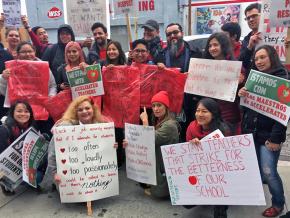LA charter teachers win their strike, too
and report on the hard-earned new contract won by teachers at three charters run by Accelerated Schools.
THE OTHER LA teacher strike is over, and it, too, ended in victory.
After more than 20 months of negotiations and nearly two weeks of striking through both rain and shine, teachers at three charter schools run by The Accelerated Schools (TAS) have voted to end the first charter school strike in the history of California.
Launched on the day after more than 30,000 public school educators went on strike, the strike of 79 teachers at the three Accelerated campuses — also members of United Teachers Los Angeles (UTLA) — continued fighting for a separate contract a week after their public counterparts successfully reached an agreement with the Los Angeles Unified School District (LAUSD).
Facing the determined opposition of the school’s Board of Trustees, Accelerated teachers successfully forced concessions that will both improve their working conditions and contribute to creating a more conducive learning environment for their students.

Organized within the UTLA as Accelerated UTLA Teachers, teachers voted overwhelmingly on January 28 to accept an agreement mediated by City Council member Curren Price that will cover the terms and conditions of employment through the 2020-21 school year.
Of the votes cast, 98.7 percent were in favor of the new agreement. Though the three primary demands of a binding arbitration agreement, a due process agreement and more competitive health care weren’t met in their entirety, the gains reported by a UTLA news release are still very significant, including:
Three months’ severance package including salary and benefits for any teacher who is not offered an employment contract from one year to the next.
An improved arbitration process that requires a unanimous vote of the Accelerated Board of Trustees in order to reverse any decision made by an arbitrator.
Annual signing bonuses of $10,000 for teachers who return to their positions at the beginning of each school year.
Formation of a Collaborative Consensus Committee for stakeholders to discuss issues and create and implement improvements to schoolwide processes and practices.
Annual increases in the employer’s share of health care costs.
With a teacher turnover rate of between 40 and 50 percent annually, these wins will help mitigate the sense of insecurity and disrespect that drove many teachers to the picket lines, while also providing a more solid foundation to advocate on behalf of themselves and the community they serve.
Also included in the agreement is a no reprisal clause, though the clause is only valid for the following year, potentially leaving outspoken teachers vulnerable to a nonrenewal of contract as a consequence of union organizing.
THE CONNECTIONS and relationships that have formed between teachers and parents through this struggle are perhaps the most significant outcome of this fight. When asked about the strike and resulting agreement, prominent organizer and teacher Kari Rivera said:
Although not perfect, I’m proud of our agreement. It has things in place now that will help teachers feel safer. They’re baby steps in the right direction. Also, we helped our parents and students find their voice. We mobilized them and showed them the power they yield. Our campuses are also very tight now. We have a deeper understanding of each other and are able to see the beauty and strengths of each group of teachers.
I saw their bravery and resilience in those moments, and I appreciate the risk they took to share them. I feel honored to have witnessed that. We spent a lot of time together and bonded in a lovely way.
The support of students and parents has been a key to the success of the strikes in Los Angeles and elsewhere. However, due to a need to organize in a more private manner, teachers and parents faced some difficulties in preparing the strike quickly enough to coincide with the much larger LAUSD strike.
Nevertheless, once the strike got underway, parents were quick to connect with each other by creating a Facebook group that established lines of communication between teachers, parents and union organizers. In order to meet the needs of parents, the group explicitly created a bilingual (English and Spanish) Facebook group to bridge the language gap that can exist between Latino and immigrant parents and English-speaking teachers.
These groups became important sources of solidarity and support during the strike. Through the Facebook parent support group, parents organized fundraisers and kept each other informed of the strike and the negotiations with daily updates.
Besides the solidarity of students and parents, the TAS strike also enjoyed the support of a widespread community of educators, activists and even musician Tom Morello, who joined strikers on the picket line and played a few songs in support.
People from around the country donated to the campaign Tacos for Teachers, an initiative spearheaded by the International Socialist Organization and the Democratic Socialists of America. The campaign donated almost $5,000 worth of food during the strike, and it helped keep picket lines fed in the afternoons.
These initiatives proved to be very important as they allowed strikers and supporters to stay on the picket lines throughout the day. Although many challenges remain, teachers of Accelerated Schools have much to be proud of and have provided another example of what is possible when communities unite in struggle.


